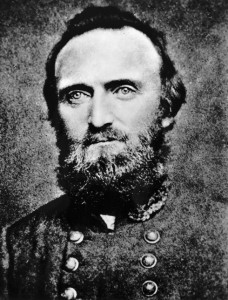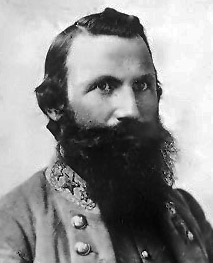About Publications Library Archives
heritagepost.org

Preserving Revolutionary & Civil War History

Preserving Revolutionary & Civil War History

The home of Richard Corbin and his family, the Moss Neck mansion, stretching 225 feet from wing to wing, sat on elevated ground two miles from the Rappahannock River. Refusing to reside in the main house, Jackson instead used a small wooden outbuilding for his office and quarters.
With Christmas fast approaching, local citizens brought so much food and gifts to Jackson that he decided to host a dinner for Generals Robert E. Lee, J.E.B. Stuart, William Pendleton, and select members of their staffs. Lieutenant James Power Smith, Jackson’s aide-de-camp, was charged with organizing the celebration, which he later described as “a famous dinner.”

Smith had little difficulty in obtaining food for the feast, remarking “an attempt to buy a turkey from a lady resulted in the present of two fine turkeys. A bucket of oysters came from somewhere down the river, and a box came to the General from Staunton ladies with another turkey, a splendid ham, a large cake, a bottle of wine, and the spaces filled with white biscuit and the best of pickles.”
On Christmas morning, Jackson took a moment to write his wife, Anna. The previous day he had received a letter from her that included a lock of hair from their one-month old daughter. Longing to see the infant for the first time, he wrote: “How I do want to see that precious baby! And I earnestly pray for peace. Oh that our country was such a Christian, God-fearing people as it should be! Then might we very speedily look for peace.” But even a newborn baby couldn’t pull him away from his responsibilities: “…whilst it would be a great comfort to see you and our darling little daughter, and others in whom I take special interest, yet duty appears to require me to remain with my command. It is important that those at headquarters set an example by remaining at the post of duty.”
Later that day, Jackson’s guests began arriving for dinner. In addition to Lee, Stuart, and Pendleton, other notable attendees included: Majors Charles Venable and Walter Taylor; along with Majors Heros Von Brocke, John Pelham, and Captain John Esten Cooke.

General Stuart arrived “in great glee” with “clanking sabre and spurs and waving black plume,” according to Smith. Never passing an opportunity to tease his good friend Stonewall, he first toured the office building, taking special note of the décor. Hanging throughout the room, Richard Corbin had pictures of race-horses, game-cocks, and a noted rat-killing terrier. With “affected astonishment,” Stuart pretended to regard the pictures as Jackson’s own selections and an indicator of the general’s private tastes. With “great solemnity” he declared that Jackson’s obvious decline in moral character would be a huge disappointment to the pious old ladies of the South, who thought he was a good man. The cavalry chief’s ribbing caused Jackson to blush “like a school girl,” leaving him speechless except for his directions to Lieutenant Smith to see “that a good dinner was prepared for General Stuart.”
The opulence of the table setting, with the addition of two servants wearing white aprons, was so out of character for Jackson’s typical modest lifestyle that General Lee also couldn’t help but make lighthearted comments to his lieutenant general on how he must only be “playing soldier,” suggesting Jackson visit his own tent to see “how a soldier ought to live.”
As the group was sitting to eat, Stuart feigned further shock to see the teetotaling Jackson serving wine with dinner. Then the cavalry general spotted a distinctive cake of butter lying on the table. A gift to Jackson from a nearby farm, the butter was imprinted with the image of a “gallant rooster.” Holding the butter aloft, Stuart called all to witness that Jackson had “carried his sporting tastes so far as to have his favorite game-cock stamped on his butter” proclaiming it to be Old Jack’s “coat-of-arms.”
Following grace said by General Pendleton, the group had a fine Christmas repast with “not many turkeys left when the day was over.”